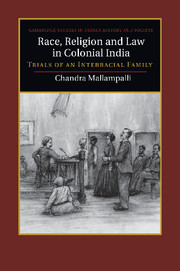Book contents
Introduction
Published online by Cambridge University Press: 05 December 2011
Summary
In a crowded commercial neighborhood of the south Indian city of Bellary, there once stood a distillery owned and operated by a Tamil-speaking Protestant named Matthew Abraham. Matthew came from the low-ranking paraiyar community (one among many so-called untouchable groups). In 1820, he married a woman of Anglo-Portuguese descent, Charlotte Fox. Since 1800, Bellary was under the rule of the English East India Company. So strategic was Bellary’s location that the Company established a military cantonment in the northwest section of the city. During the 1830s, Matthew became wealthy by producing liquor and selling it to the troops. His younger brother Francis assisted him at the distillery and assumed its management after his death. For a time, the interracial couple, their two “half-caste” sons, Francis, and members of their extended family shared a common household and enjoyed a relatively affluent lifestyle under Company rule.
As they linked the worlds of liquor, Protestantism, and the army, the Abrahams made the most of their circumstances in colonial Bellary. Over the span of fifteen years, they acquired considerable wealth through their distillery business, a shop, and other investments. They conducted business with leading European mercantile firms of south India. By channeling funds through an international lending house, they financed the education of their eldest son, Charles Henry, at Queens’ College Cambridge. The family also owned six bungalows, which they rented to colonial officers or used to host family parties and balls. They used profits from their distillery and rental income to invest in the sale of other commodities such as cotton, wax, and military surplus items.
- Type
- Chapter
- Information
- Race, Religion and Law in Colonial IndiaTrials of an Interracial Family, pp. 1 - 24Publisher: Cambridge University PressPrint publication year: 2011



